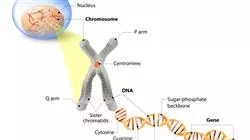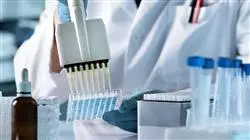University certificate
The world's largest faculty of medicine”
Introduction to the Program
Acquire the knowledge required for advanced genetic interventions in the field of cardiovascular diseases"

This Postgraduate diploma offers a review of basic concepts in the subject It addresses inheritance models and their applicability in daily clinical practice. It shows the variability of the human genome and its significance and impact at the clinical level. It offers a practical methodology in the gathering of information necessary for the construction of the genogram, exposing the symbology and graphic representation of such information, as well as practical exercises for the handling and mastery of this tool.
The use of genetic analysis for diagnostic purposes is being integrated into routine care exponentially in recent years, so it is important to provide students with knowledge to familiarize them with the technical approaches and ethical implications of these methods. All the techniques currently used for diagnosis in clinical genetics, their advantages and limitations will be described.
The great development of cardiogenetics in recent years has led to the redefinition of numerous heart diseases with the consequent change in therapeutic management. In modern medicine, a complete knowledge of the genetic and pathophysiological basis of these diseases is essential. This module combines the fundamental bases of molecular biology, genetics, cardiac imaging, electrophysiology and clinical cardiology for a comprehensive practical and applied view of inherited cardiovascular diseases.
An intensive and comprehensive way of working that will allow you to acquire new professional skills in the field of genetic cardiology"
This online Postgraduate diploma offers you the benefits of a high-level scientific, educational and technological course. These are some of its most notable features:
- Latest technology in online teaching software
- Highly visual teaching system, supported by graphic and schematic contents that are easy to assimilate and understand
- Practical cases presented by practising experts
- State-of-the-art interactive video systems
- Teaching supported by telepractice
- Continuous updating and recycling systems
- Self-regulating learning: full compatibility with other occupations
- Practical exercises for self-evaluation and learning verification
- Support groups and educational synergies: questions to the expert, debate and knowledge forums
- Communication with the teacher and individual reflection work
- Content that is accessible from any fixed or portable device with an Internet connection
- Supplementary documentation databases are permanently available, even after the course
A training program that masterfully combines intensity and flexibility, making its objectives easily and comfortably achievable for the professional"
This program has been developed by professionals from different clinical genetics clinics in which they contribute their experience in daily practice, in the care of patients and families with a variety of hereditary disorders, both in genetic counseling and in prevention programs and prenatal and preconception counseling. The faculty involved in the Postgraduate diploma also carries out important research work in the field of Genetics.
The Postgraduate diploma addresses, in its different modules, the basic and necessary knowledge for the management of patients and their diseases in a clinical genetics practice. It offers a practical approach to the different techniques most commonly used for the diagnosis of hereditary diseases, as well as the interpretation of their results. It offers an approach to the diseases that cause the highest number of consultations in daily practice in a Clinical Genetics service.
The diploma contains theoretical text about the subject matter, and practical examples taken from clinical cases that will facilitate understanding and the acquisition of in-depth knowledge.
Increase your decision-making confidence by updating your knowledge with this University Expert course"

You will be trained by professionals with extensive experience in the sector, who have contributed all their knowledge and experience in the development of this program"
Why study at TECH?
TECH is the world’s largest online university. With an impressive catalog of more than 14,000 university programs available in 11 languages, it is positioned as a leader in employability, with a 99% job placement rate. In addition, it relies on an enormous faculty of more than 6,000 professors of the highest international renown.

Study at the world's largest online university and guarantee your professional success. The future starts at TECH”
The world’s best online university according to FORBES
The prestigious Forbes magazine, specialized in business and finance, has highlighted TECH as “the world's best online university” This is what they have recently stated in an article in their digital edition in which they echo the success story of this institution, “thanks to the academic offer it provides, the selection of its teaching staff, and an innovative learning method aimed at educating the professionals of the future”
A revolutionary study method, a cutting-edge faculty and a practical focus: the key to TECH's success.
The most complete study plans on the university scene
TECH offers the most complete study plans on the university scene, with syllabuses that cover fundamental concepts and, at the same time, the main scientific advances in their specific scientific areas. In addition, these programs are continuously being updated to guarantee students the academic vanguard and the most in-demand professional skills. In this way, the university's qualifications provide its graduates with a significant advantage to propel their careers to success.
TECH offers the most comprehensive and intensive study plans on the current university scene.
A world-class teaching staff
TECH's teaching staff is made up of more than 6,000 professors with the highest international recognition. Professors, researchers and top executives of multinational companies, including Isaiah Covington, performance coach of the Boston Celtics; Magda Romanska, principal investigator at Harvard MetaLAB; Ignacio Wistumba, chairman of the department of translational molecular pathology at MD Anderson Cancer Center; and D.W. Pine, creative director of TIME magazine, among others.
Internationally renowned experts, specialized in different branches of Health, Technology, Communication and Business, form part of the TECH faculty.
A unique learning method
TECH is the first university to use Relearning in all its programs. It is the best online learning methodology, accredited with international teaching quality certifications, provided by prestigious educational agencies. In addition, this disruptive educational model is complemented with the “Case Method”, thereby setting up a unique online teaching strategy. Innovative teaching resources are also implemented, including detailed videos, infographics and interactive summaries.
TECH combines Relearning and the Case Method in all its university programs to guarantee excellent theoretical and practical learning, studying whenever and wherever you want.
The world's largest online university
TECH is the world’s largest online university. We are the largest educational institution, with the best and widest online educational catalog, one hundred percent online and covering the vast majority of areas of knowledge. We offer a large selection of our own degrees and accredited online undergraduate and postgraduate degrees. In total, more than 14,000 university degrees, in eleven different languages, make us the largest educational largest in the world.
TECH has the world's most extensive catalog of academic and official programs, available in more than 11 languages.
Google Premier Partner
The American technology giant has awarded TECH the Google Google Premier Partner badge. This award, which is only available to 3% of the world's companies, highlights the efficient, flexible and tailored experience that this university provides to students. The recognition as a Google Premier Partner not only accredits the maximum rigor, performance and investment in TECH's digital infrastructures, but also places this university as one of the world's leading technology companies.
Google has positioned TECH in the top 3% of the world's most important technology companies by awarding it its Google Premier Partner badge.
The official online university of the NBA
TECH is the official online university of the NBA. Thanks to our agreement with the biggest league in basketball, we offer our students exclusive university programs, as well as a wide variety of educational resources focused on the business of the league and other areas of the sports industry. Each program is made up of a uniquely designed syllabus and features exceptional guest hosts: professionals with a distinguished sports background who will offer their expertise on the most relevant topics.
TECH has been selected by the NBA, the world's top basketball league, as its official online university.
The top-rated university by its students
Students have positioned TECH as the world's top-rated university on the main review websites, with a highest rating of 4.9 out of 5, obtained from more than 1,000 reviews. These results consolidate TECH as the benchmark university institution at an international level, reflecting the excellence and positive impact of its educational model.” reflecting the excellence and positive impact of its educational model.”
TECH is the world’s top-rated university by its students.
Leaders in employability
TECH has managed to become the leading university in employability. 99% of its students obtain jobs in the academic field they have studied, within one year of completing any of the university's programs. A similar number achieve immediate career enhancement. All this thanks to a study methodology that bases its effectiveness on the acquisition of practical skills, which are absolutely necessary for professional development.
99% of TECH graduates find a job within a year of completing their studies.
Postgraduate Diploma in Diagnostic Techniques and Cardiovascular Diseases in Clinical Genetics.
Diagnostic techniques and cardiovascular diseases in clinical genetics refer to the study of cardiovascular diseases of genetic origin, and the tools available for the diagnosis and prevention of these diseases.
Cardiovascular diseases are those that affect the circulatory system and can lead to serious health problems, such as heart attacks, strokes, arterial hypertension, among others. Epidemiological studies have shown that many cardiovascular diseases have a genetic component, which means that they can be hereditary and affect multiple members of a family. Clinical genetics is responsible for studying these cardiovascular diseases and providing tools for their diagnosis and prevention.
Learn about the latest diagnostic techniques in cardiovascular diseases through clinical genetics.
Genetic analysis: DNA analysis can be performed to detect the presence of genetic mutations associated with inherited cardiovascular diseases, such as hypertrophic cardiomyopathy or Marfan disease.
Family screening: families with a history of inherited cardiovascular disease can be identified and the risk of recurrence in future generations can be assessed.
Preventive testing: based on genetic and clinical information, preventive testing can be offered to minimize the risk of developing cardiovascular disease. These tests may include regular medical examinations, lifestyle changes and drug therapy.
Diagnostic and cardiovascular disease techniques in clinical genetics are essential for the early identification and prevention of cardiovascular diseases of genetic origin. In this way, it contributes to improving the quality of life of patients and families affected by these diseases.
TECH the world's largest digital university has a specialized academic program designed to provide students with solid skills in clinical genetics and specialized knowledge in the diagnosis and management of cardiovascular disorders of genetic origin. Students will learn to apply advanced molecular diagnostic and genetic techniques for the diagnosis and treatment of inherited disorders and work in multidisciplinary teams to provide a comprehensive approach to patient care.







